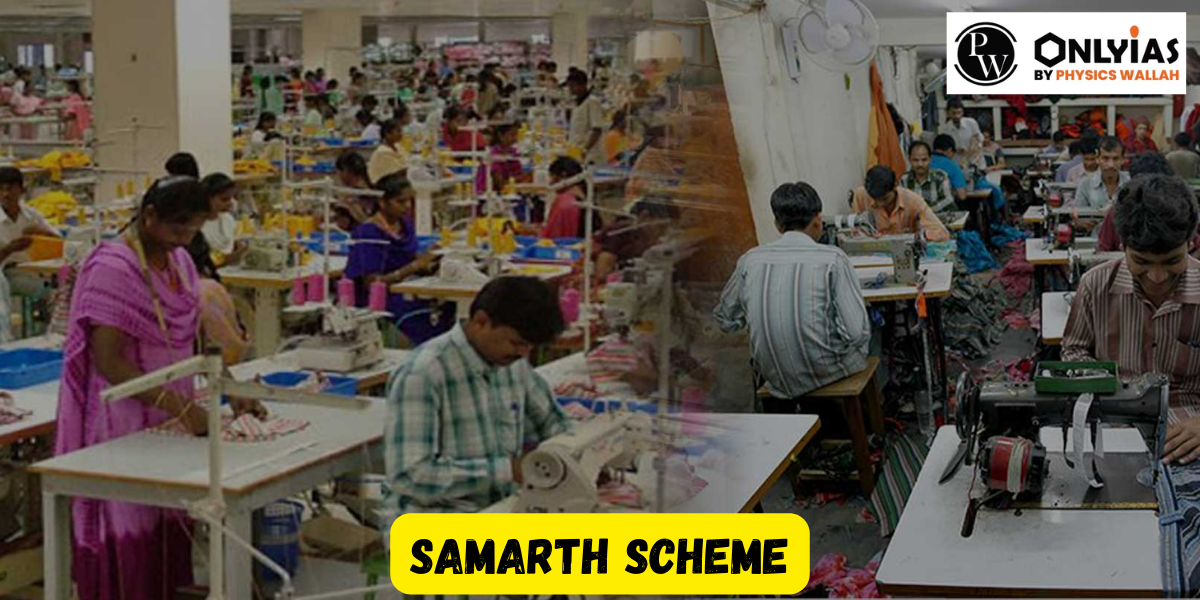In this article we will have a look at the Samarth Scheme by Ministry of Textiles and all the details of related to Samarth Scheme.

Samarth Scheme: The Ministry of Textiles is actively implementing the Samarth Scheme, a flagship initiative for Capacity Building in the Textiles Sector (SCBTS). The primary goal is to train 10 lakh individuals between 2017-2020, covering the entire textiles value chain, excluding spinning and weaving in the organized sector.
In this article we will have a look at the Samarth Scheme by Ministry of Textiles and all the details of related to Samarth Scheme.
| Full Name | Scheme for Capacity Building in the Textile Sector (SCBTS) |
|---|---|
| Launch Year | Approved by Cabinet Committee on Economic Affairs (CCEA) in 2017 |
| Official Site | https://samarth-textiles.gov.in/about_us |
| Concerned Ministry | Ministry of Textiles |
| Target Sector | Organized and Traditional Sector |
| Scheme Objective | Train 10 lakh persons in the entire value chain of textiles excluding spinning and weaving in the organized sector. |
In the past three years, over 13,235 artisans have undergone training under the SAMARTH Scheme of the Textile Ministry.
Samarth, or the Scheme for Capacity Building in the Textile Sector, stands as a flagship skill development initiative. It gained approval as a continuation of the Integrated Skill Development Scheme for the 12th Five-Year Plan by the Cabinet Committee of Economic Affairs.
The office of the Development Commissioner (Handicrafts) is the executing body for SAMARTH. It operates under the ‘Skill Development in Handicrafts Sector’ component of the National Handicrafts Development Programme (NHDP).
Understanding these initiatives is crucial for IAS Exam candidates to stay informed about the developments in the textile sector.
The textiles and garments industry, employing 45 million people, is a major labor-intensive sector in India, second only to agriculture in terms of employment.
The SAMARTH Scheme contributes to the broader landscape of initiatives dedicated to advancing and sustaining India’s textile sector.
| Also Read | |
| National Digital Health Mission | Solar Charkha Mission |
| Mission Karmayogi | Atmanirbhar Bharat Abhiyaan |
| Must Read | |
| NCERT Notes For UPSC | UPSC Daily Current Affairs |
| UPSC Blogs | UPSC Daily Editorials |
| Daily Current Affairs Quiz | Daily Main Answer Writing |
| UPSC Mains Previous Year Papers | UPSC Test Series 2024 |
The program's goal is to foster job connections by fostering collaboration with the Textile Industry. Samarth is a Ministry of Textiles initiative that prioritizes meeting demand and facilitating job placements. This scheme will be in effect until March 2024.
On March 7, 2022, in New Delhi, Union Minister for MSME Narayan Rane initiated a distinctive campaign to foster entrepreneurship among women, known as "SAMARTH."
The Samarth Scheme, a flagship initiative for enhancing capacity in the textile sector, is being carried out by the Ministry of Textile.
The SAMARTH Scheme is a program within the Ministry of Textiles known as the Scheme for Capacity Building in the Textile Sector (SCBTS). SAMARTH is designed to meet the demands of the textile industry and focuses on skill development and job placement.
The age limit of Samarth Scheme is that the candidate must be at least 14 years old.
<div class="new-fform">
</div>